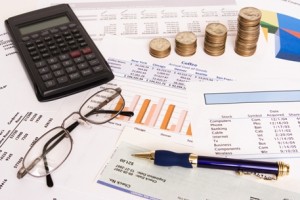Accountant and Auditor Career Path
 If you think a career in accounting might be for you, try working in a retail business, either part time or during the summer. Working at the cash register or even pricing products as a stockperson is good introductory experience. You should also consider working as a treasurer for a student organization requiring financial planning and money management. It may be possible to gain some experience by volunteering with local groups such as churches and small businesses. You should also stay abreast of news in the field by reading trade magazines and checking out the industry Web sites of the AICPA and other accounting associations. The AICPA has numerous free educational publications available.
If you think a career in accounting might be for you, try working in a retail business, either part time or during the summer. Working at the cash register or even pricing products as a stockperson is good introductory experience. You should also consider working as a treasurer for a student organization requiring financial planning and money management. It may be possible to gain some experience by volunteering with local groups such as churches and small businesses. You should also stay abreast of news in the field by reading trade magazines and checking out the industry Web sites of the AICPA and other accounting associations. The AICPA has numerous free educational publications available.
Employers
More than 1.2 million people are employed as accountants and auditors. Accountants and auditors work throughout private industry and government. About one quarter work for accounting, auditing, and bookkeeping firms. Approximately 10 percent are self-employed. A large percentage of all accountants and auditors are certified.
Starting Out
Junior public accountants usually start in jobs with routine duties such as counting cash, verifying calculations, and other detailed numerical work. In private accounting, beginners are likely to start as cost accountants and junior internal auditors. They may also enter in clerical positions as cost clerks, ledger clerks, and timekeepers or as trainees in technical or junior executive positions. In the federal government, most beginners are hired as trainees at the GS-5 level after passing the civil service exam.
Some state CPA societies arrange internships for accounting majors, and some offer scholarships and loan programs.
You might also visit the AICPA Web site. It has detailed information on accounting careers, hiring trends, job search strategies, resumes and cover letters, and job interviews. The section also has a list of internship opportunities for students.
Advancement
Talented accountants and auditors can advance quickly. Junior public accountants usually advance to senior positions within several years and to managerial positions soon after. Those successful in dealing with top-level management may eventually become supervisors, managers, and partners in larger firms or go into independent practice. However, only 2 to 3 percent of new hires advance to audit manager, tax manager, or partner.
Private accountants in firms may become audit managers, tax managers, cost accounting managers, or controllers, depending on their specialty. Some become controllers, treasurers, or corporation presidents. Others on the finance side may rise to become managers of financial planning and analysis or treasurers.
Federal government trainees are usually promoted within a year or two. Advancement to controller and to higher administrative positions is ultimately possible.
Although advancement may be rapid for skilled accountants, especially in public accounting, those with inadequate academic or professional training are often assigned to routine jobs and find it difficult to obtain promotions. All accountants find it necessary to continue their study of accounting and related areas in their spare time. Even those who have already obtained college degrees, gained experience, and earned a CPA certificate may spend many hours studying to keep up with new industry developments. Thousands of practicing accountants enroll in formal courses offered by universities and professional associations to specialize in certain areas of accounting, broaden or update their professional skills, and become eligible for advancement and promotion.
Earnings
Beginning salaries for accountants with a bachelor’s degree averaged $43,269 a year in 2004; those with a master’s degree averaged $46,251 a year, according to the National Association of Colleges and Employers. Auditors with up to one year of experience earned between $28,250 and $45,000, according to a 2005 survey by Robert Half International. Some experienced auditors may earn between $52,000 and $200,000, depending on such factors as their education level, the size of the firm, and the firm’s location.
According to the U.S. Department of Labor, accountants and auditors had median annual earnings of $50,770 in 2004. The lowest paid 10 percent earned less than $32,230, and the highest paid 10 percent earned more than $88,610. In the federal government, the average starting salary for junior accountants and auditors was $24,677 in 2004. Some entry-level positions paid slightly more if the candidate had an advanced degree or superior academic performance. Accountants working for the federal government in supervisory and management positions had average salaries of $74,907 a year in 2004; auditors averaged $78,890. Although government accountants and auditors make less than those in other areas, they do receive more benefits.
Work Environment
 Accounting is known as a desk job, and a 40-hour (or longer) workweek can be expected in public and private accounting. Although computer work is replacing paperwork, the job can be routine and monotonous, and concentration and attention to detail are critical. Public accountants experience considerable pressure during the tax period, which runs from November to April, and they may have to work long hours. There is potential for stress aside from tax season, as accountants can be responsible for managing multimillion-dollar finances with no margin for error. Self-employed accountants and those working for a small firm can expect to work longer hours; 40 percent work more than 50 hours per week, compared to 20 percent of public and private accountants.
Accounting is known as a desk job, and a 40-hour (or longer) workweek can be expected in public and private accounting. Although computer work is replacing paperwork, the job can be routine and monotonous, and concentration and attention to detail are critical. Public accountants experience considerable pressure during the tax period, which runs from November to April, and they may have to work long hours. There is potential for stress aside from tax season, as accountants can be responsible for managing multimillion-dollar finances with no margin for error. Self-employed accountants and those working for a small firm can expect to work longer hours; 40 percent work more than 50 hours per week, compared to 20 percent of public and private accountants.
In smaller firms, most of the public accountant’s work is performed in the client’s office. A considerable amount of travel is often necessary to service a wide variety of businesses. In a larger firm, however, an accountant may have very little client contact, spending more time interacting with the accounting team.
Browse Accounting Careers.
